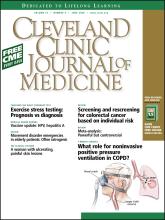Table of Contents
From the Editor
- Meta-analyses, metaphysics, and reality
Be very careful about directly translating conclusions from meta-analyses into clinical practice.
Medical Grand Rounds
- Update on infectious disease prevention: Human papillomavirus, hepatitis A
Vaccination against human papillomavirus prevents cervical intraepithelial neoplasia and genital warts and is likely cost-effective. Hepatitis A vaccine is as effective as hepatitis A immune globulin for postexposure prophylaxis against hepatitis A.
The Clinical Picture
- A woman with ulcerating, painful skin lesions
She has previously enjoyed good health, has no personal or family history of liver, pancreatic, renal, or lung disease, and is taking no medications. What is the diagnosis?
Choosing the Right Coronary Test
- The exercise treadmill test: Estimating cardiovascular prognosis
Abnormal hemodynamic responses to exercise may indicate an increased risk of coronary events and death, even without evidence of ischemia. Exercise duration and the blood pressure, heart rate, and heart rhythm responses to exercise have prognostic significance.
Review
- Meta-analysis: Its strengths and limitations
Meta-analysis is powerful but also controversial, because several conditions are critical to a sound meta-analysis, and small violations of those conditions can produce misleading results.
- Understanding current guidelines for colorectal cancer screening: A case-based approach
Fewer than half of the people in the United States who should be screened for colorectal cancer have actually been screened. But at the same time, many people who have low-risk findings on colonoscopy may be returning unnecessarily soon.
- Movement disorder emergencies in the elderly: Recognizing and treating an often-iatrogenic problem
These problems often occur in patients with Parkinson disease or those taking antipsychotic or antidepressant drugs when their regimen is started or changed. Elderly patients are particularly at risk.
1-Minute Consult
- Does noninvasive positive pressure ventilation have a role in managing hypercapnic respiratory failure due to an acute exacerbation of COPD?
Yes. In selected patients, this therapy reduces the need for endotracheal intubation, the hospital length of stay, and the risk of death.




